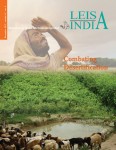
The sprawling economic development and constant consumption of land resources in an unsustainable manner has come with a big price- degradation of land. The major causes for this can be attributed to industrial pollution, over grazing by animals, deforestation and careless management of forests and it rich and diverse resources and excessive mining. The impact is severe on ecologically fragile and dryland areas which often drives small farmers out from agriculture.
To deal with these problems the conventional approach is not enough as they rely on modern approach to agriculture that commercialises the entire agricultural activity. Further those methods do not adhere to fragile areas. What is gaining momentum now is promising initiatives taken by farmers, NGOs and scientists over past decades have laid the basis for a new agricultural paradigm. The central concept to this paradigm is resilience that has 2 aspects:
- ecological resilience
- coping with drought and climate change, and socio-political resilience, the ability of farmers to develop their skills and voices to choose their own development path.
A small selection of these experiences is presented in this issue of LEISA India called “Combating desertification”. The issue has the following chapters:
- Managing drought for mitigating desertification
- Sustaining livelihoods of desert communities: An innovative farming-system based livelihood model
- Loss in biodiversity with desertification in Arid Rajasthan
- Interview: Evidence of success
- Development through convergence enhancing rural livelihoods through watershed development
- Trees on common lands protecting environment, improving livelihoods
- Combat desertification it’s time to act
- Farmers diary natural capital holds the key
- Systems approach to agriculture
- Trees are our life saviours
Click here to access the full magazine.
/articles/transformation-landscape-desert-replenished-watershed-kaluchi-thakarwadi-maharashtra